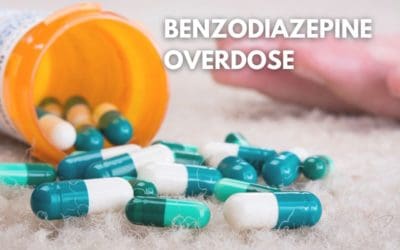Benzodiazepines are sedative medications that create calming effects for patients suffering from mental health disorders like anxiety, insomnia, or seizures. It can also be prescribed for alcohol withdrawal symptoms or as a muscle relaxant. However, benzos are highly addictive and can lead to the risk of suicide, suicidal thoughts, and suicidal ideations.
Different types of benzodiazepines have various strengths and intensities. Before you start taking a benzo prescription, learn more about their strengths and dangers.
What Is the Strongest Benzodiazepine?
Alprazolam is the only high-potency benzodiazepine developed in an XR (extended-release) formulation.
Nonetheless, the strength of benzos depends on the drug’s potency and its half-life, meaning how long it takes the drug to break down and exit the body. In addition, the half-life, dosage, the use of other drugs, and other factors such as weight, age, and gender will impact the potency of benzos.
High-potency benzodiazepines:
For its high potency and long-lasting effects, the most potent benzodiazepine is Clonazepam, also known as Klonopin.
Other high-potency but short-acting benzos are alprazolam (Xanax), lorazepam (Ativan), and triazolam (Halcion).
Medium-potency benzos:
There are medium-strength/medium-acting benzodiazepines like clobazam (One), and then there are the weakest kinds of benzos.
Low-potency benzodiazepines:
With low-potency and short-acting effects, there are diazepam (Serax) and temazepam (Restoril). Also low-potent but long-acting, there are chlordiazepoxide (Librium), clorazepate (Tranxene), diazepam (Valium), and flurazepam (Dolman).
Benzodiazepines Addiction Risks
Depending on how long they last, benzos can be used or prescribed for different purposes. However, they can all lead to dependency, no matter their strength or time to take effect. Even the weakest benzos can be highly addictive.
High-potent benzos tend to act faster, and users feel the effects instantly. Most users tend to look for highly potent, short-acting benzos. Xanax, for example, provides an intense impact that makes it extremely popular.
Due to benzodiazepines’ effects on the central nervous system, they can sometimes block nerve impulses. If used properly, the central nervous system can still function correctly, but with high doses, there can be trouble breathing, slower heart rates, and general weakness where the patient can end up in a coma or death.
What Is the Strongest Benzodiazepine for Anxiety?
Clonazepam, the most potent benzodiazepine, is used to treat seizures and anxiety disorders. Xanax can be considered the most potent benzodiazepine to treat anxiety.
Alprazolam is one of the strongest short-acting benzodiazepines and is often prescribed by doctors because its half-life is shorter than 26 hours.
Xanax has been listed as one of the top 10 drugs responsible for most overdose deaths in the United States. So even if professional doctors prescribe it, its medication should be supervised with a great deal of care.
What Is the Strongest Benzodiazepine for Sleep?
Nitrazepam, loprazolam, and lormetazepam are the strongest and most effective benzos that can work as sleeping pills to treat insomnia.
Some drugs prescribed for anxiety can help patients sleep better if they are mandated to take them at night. When taken in smaller or lower doses, sleeping pills can help patients feel calm during the day.
It can depend on each body’s metabolizing process for benzodiazepines to achieve their desired effect. That’s why it’s always recommended to check in constantly with a doctor on how the drugs are working.
Dangers of Benzodiazepines
Aside from addiction, benzodiazepine abuse carries with it a host of adverse health effects and dangers. These include:
- Alzheimer’s disease
- Dementia
- Congenital disabilities
- Confusion
- Irregular heartbeat
- Vertigo
Prolonged benzodiazepine abuse can cause some of the very problems the drugs are designed to treat. When a physically dependent person quits benzodiazepines, withdrawal can set in. In some instances, withdrawal may last for several months.
Benzodiazepine overdose is another considerable risk associated with the abuse of these drugs. Benzos are also frequently abused with other drugs, commonly with alcohol and opioids, also central nervous system depressants. This combination makes benzodiazepines even more dangerous and deadly.
Keep in mind; an overdose is a medical emergency. If an overdose is suspected, contact emergency medical support services immediately.
Finding Treatment
No matter what drugs you take, abusing substances can be severe. Treatment for benzodiazepine addiction requires medical detox to have the support to deal with withdrawal symptoms. Following up, patients need to continue treatment with a drug rehabilitation program designed to treat benzo addiction.
The psychological and physical impacts of addiction can be challenging and require intensive care. A comprehensive rehab program is designed to meet your needs and help you overcome your addiction.
If you or someone you love is struggling with benzodiazepine addiction, please know there’s help available.


































